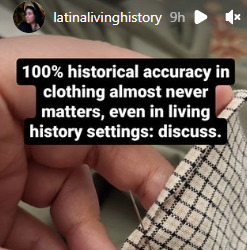#historically adequate
Text

I have a lot of opinions on this but I would love to know what other people think.
#sewing#living history#historical costuming#history#historical reenactment#historical accuracy#historically accurate#historically adequate#historical sewing#museums#material culture#experimental archaeology
326 notes
·
View notes
Text
Hear me out:
Renaissance Festival outfit
Elizabethan bodies and overskirt out of this

With an unbleached muslin chemise and underskirt?
36 notes
·
View notes
Note
what part of italy are machete and vasco from? not their birthplace since from what i've seen you're still workshopping that. where do they live? i assume rome?
In the 1500's setting Vasco lives and was born in Florence, his family has lived there for centuries. Machete was born in Sicily, was taken to Naples to serve as an apprentice and ended up living and working in Rome (and more specifically today's Vatican city, which as you may know has been an independent country since 1929 but wasn't back then). They first met when they were both studying in Venice in their late teens/early twenties.
I think in the modern au they live together somewhere in Florence.
#characters travelling this extensively at the time#from one end of the country to another#may not be very realistic but it's more fun to include a variety of interesting historical locations#let me be greedy and self indulgent for a moment#(not to mention that Italy wasn't unified until late 1800's and was instead made of various states kingdoms and duchies#that didn't always get along with each other that well and were culturally and linguistically diverse#and some of them were actually ruled Spain and Austria for example)#I say this as lovingly as possible but the history of Italian peninsula as a whole is just a real clusterfuck#I feel like I still haven't wrapped my head around it adequately to be explaining any of this to you#but please be patient with me I promise I'm trying my best#answered#anonymous
185 notes
·
View notes
Text

A little Scooby Doo “fanart” thing heavily based off the following pic of Alaska y los pegamoides (a New Wave group from the early 80’s in Spain 😁😁😁). Retrospectively the staring at the camera reminded me of the intro shot in the original scooby doo where Velma is reading a book and is at the centre. :-)

#Have not posted in a while I am just having my silly summer times :-)#Btw yes I drew Velma as south Asian but not bcos of “Velma 2023” (😵😵) it is simply something I thought looked cute 😁😁#Alaska y los pegamoides#Scooby doo#Daphne Blake#Velma Dinkley#m87 stuff#YES daphne is a communist. YES velma is wearing a pride pin. They are very politically conscious and are enjoying the Movida Madrileña#(Note: I am making all of this up. I like Spanish history :-P)#art#vaphne#sort of !!#EDIT: i have just seen an excellent post discussing the problematic connotations of the sickle communist symbol (USSR and its disgusting —#— history in the countries it colonised and exploited etc.) Just to be clear I am using the flag in this context as a historical detail—#— since in late 1970’s spain Spanish leftism would have used this symbol no problem. I don’t know if that is an adequate contextualisation—#—if anyone who wants to chip in would like to send me an ask pls do :-)
27 notes
·
View notes
Text
Ya know, I love sewing, in theory, but the math and the fabric cutting anxiety? Not a fan.
But I bought 'fancy' fabric, I should do the thing where I make it into a thing. And I found some fabric I don't feel bad about using for a mock-up in my stash.
BUT THE ANXIETY
#lilleproblems#i am gonna make a kirtle#well kinda i dont wanna make sleeves so I might go for a different neckline#because while i might want it to be historically adequate#i also want it to be something cute i can wear just for my me#which reminds me i should also make a new shirt/chemise type thing#because while i am proud of the first attempt#i feel like i can do better ya know#... do i put pockets in my kirtle i think the answer is yes#dont mind me i am just screaming into the void today
13 notes
·
View notes
Text

jwds but it’s historical au, jw’s a nobleman and ds’s like a merchant or advisor or smthng i dunno. anyways i’ve been thinking abt only them for a month straight so here is my contribution. anyways explaining the images- there’s a seal and money on jw’s side to show that he is originally powered by money and legitimacy and power and there’s a bun and a knife on ds’s side because he is someone who lives just to survive after losing yy. the fish bones r a nod to jw not liking fishy stews and how both have skeletons in their closet. also because the bones show how both of them “die” and are reborn over the show. anyways idk if this makes sense but i love them that is all
#jwds#jwds fanart#beyond evil#괴물#shin ha kyun#yeo jin goo#han juwon#han joowon#lee dongsik#fanart#i love juwon’s expression he looks so bitchy#i don’t have adequate words for lds with long hair#they’re insane your honor#historical au
11 notes
·
View notes
Text
we're at the battle by the ohio rn and a woman keeps being mentioned. what's going on here
#not a worker or anything but a lady decked out in gold who rides beside the general???? girl who are you#also children just got fucking shot so i will give this book a thumbs up for adequately portraying the horrors of war#unlike CERTAIN OTHER HISTORICAL ROMANCE NOVELS ABOUT GEORGE WASHINGTON#ray reads
14 notes
·
View notes
Text
got the rest of the supplies i needed to make iron gall ink and to bleach my cyanotypes BUT i forgot my avó's old marmalade pot at her house yesterday 😭 iron gall ink making delayedddd
#so today will be for warp setup & cyanotype bleaching & reed quill carving !#wish i had bird quills but id have to ask a former friend for some from her uncle and idk...#but there's also precedent for reed quills as far as i can tell ? and the artwork manuscript im making isn't a historical reproduction#or meant to be completely historically accurate (just historically adequate !) so it's all goody :^) ☀️#maker's diary
4 notes
·
View notes
Text
Favourite Things OC Tag Game
Rules: Share photos of your OC’s favorite things in the categories indicated by the user who tagged you. Then tag four people and change up any one of the four favorite thing categories for the next round.
@kjscottwrites tagged me to do favourite flower // favourite beverage // favourite type of shoes // favourite weather! As usual, the characters are from Miniature Roses.
Minnie Teasdale's Favourites!

baby's breath // ginger tea // oxford flats // partly cloudy with a light breeze (day), clear starry skies (night)
Ruzena Vitova's Favourites!

dahlias // blood (OBVIOUSLY sorry) // embroidered court shoes // snowfall
Replace favourite beverage with favourite form of entertainment, and my tags are: @pbjplatypus @blujayonthewing @amerillo342 @frenchy-and-the-sea
And of course, an open tag to anyone who would like to do it! This one was fun!
#you may politely @ me if these shoes are not adequately historical#it is SHOCKINGLY HARD to find good info on historical shoes in a short-ish amount of googling time#ruzena's shoes came from a museum collection and the date isn't even labelled!#also I know I know blood is such a cheat answer for beverage#if you must know before she was a vampire she liked lemonade best#but it's been 120ish years she barely remembers the taste :(#miniature roses#tag games#oc tag minnie#oc tag ruzena#mr notes
6 notes
·
View notes
Text
I can't remember if I mentioned this but my favorite roommate who Im fucking stupid for. informed me that they and their long-term partner are actually in an open relationship and I literally just froze and started sweating bc I was like "be normal be normal do not say anything fucking weird please God" and I don't think i did but by god. What and experience. What a rush. Letmein.jpeg
#once im adequately healed im gonna join their gf'd historically accurate fencing group and i qm praying ti fucking god#that she will best me#into a wall#🥴#who said that
1 note
·
View note
Text
"Efficiency" left the Big Three vulnerable to smart UAW tactics

Tomorrow (September 22), I'm (virtually) presenting at the DIG Festival in Modena, Italy. Tomorrow night, I'll be in person at LA's Book Soup for the launch of Justin C Key's "The World Wasn’t Ready for You." On September 27, I'll be at Chevalier's Books in Los Angeles with Brian Merchant for a joint launch for my new book The Internet Con and his new book, Blood in the Machine.

It's been 143 days since the WGA went on strike against the Hollywood studios. While early tactical leaks from the studios had studio execs chortling and twirling their mustaches about writers caving once they started losing their homes, the strikers aren't wavering – they're still out there, pounding the picket lines, every weekday:
https://www.cnbc.com/2023/08/09/how-hollywood-writers-make-ends-meet-100-days-into-the-writers-guild-strike.html
The studios obviously need writers. That gleeful, anonymous studio exec who got such an obvious erotic charge at the thought of workers being rendered homeless as punishment for challenging his corporate power completely misread the room, and his comments didn't demoralize the writers. Instead, they inspired the actors to go on strike, too.
But how have the writers stayed out since May Day? How have the actors stayed out for 69 days since their strike started on Bastille Day? We can thank the studios for that! As it turns out, the studios have devoted so much energy to rendering creative workers as precarious as possible, hiring as little as they can getting away with and using punishing overtime as a substitute for adequate staffing that they've eliminated all the workers who can't survive on side-hustles and savings for six or seven months at a time.
But even for those layoff-hardened workers, long strikes are brutal, and of course, all the affiliated trades, from costumers to grips, are feeling the pain. The strike fund only goes so far, and non-striking, affected workers don't even get that. That's why I've been donating regularly to the Entertainment Community Fund, which helps all affected workers out with cash transfers (I just gave them another $500):
https://secure2.convio.net/afa/site/Donation2?df_id=8117&8117.donation=form1&mfc_pref=T
As hot labor summer is revealed as a turning point – not just a season – long strikes will become the norm. Bosses still don't believe in worker power, and until they get their minds right, they're going to keep on trying to starve their workforces back inside. To get a sense of how long workers will have to hold out, just consider the Warrior Met strike, where Alabama coal-miners stayed out for 23 months:
https://www.thenation.com/article/activism/warrior-met-strike-union/
As Kim Kelly explained to Adam Conover in the latest Factually podcast, the Alabama coal strikers didn't get anywhere near the attention that the Hollywood strikers have enjoyed:
https://www.youtube.com/watch?v=UvyMHf7Yg0Q
(To learn more about the untold story of worker organizing, from prison unions to the key role that people of color and women played in labor history, check out Kelly's book, "Fight Like Hell," now in paperback:)
https://www.simonandschuster.com/books/Fight-Like-Hell/Kim-Kelly/9781982171063
Which brings me to the UAW strike. This is an historic strike, the first time that the UAW has struck all of the Big Three automakers at once. Past autoworkers' strikes have marked turning points for all American workers. The 1945/46 GM strike established employers' duty to cover worker pensions, health care, and cost of living allowances. The GM strike created the American middle-class:
https://prospect.org/labor/2023-09-18-uaw-strikes-built-american-middle-class/
The Big Three are fighting for all the marbles here. They are refusing to allow unions to organize EV factories. Given that no more internal combustion cars will be in production in just a few short years, that's tantamount to eliminating auto unions altogether. The automakers are flush with cash, including billions in public subsidies from multiple bailouts, along with billions more from greedflation price-gouging. A long siege is inevitable, as the decimillionaires running these companies earn their pay by starving out their workers:
https://www.businessinsider.com/general-motors-ceo-mary-barra-salary-auto-workers-strike-uaw-2023-9
The UAW knows this, of course, and their new leadership – helmed by the union's radical president Shawn Fain – has a plan. UAW workers are engaged in tactical striking, shutting down key parts of the supply chain on a rolling basis, making the 90-day strike fund stretch much farther:
https://prospect.org/blogs-and-newsletters/tap/2023-09-18-labors-militant-creativity/
In this project, they are greatly aided by Big Car's own relentless pursuit of profit. The automakers – like every monopolized, financialized sector – have stripped all the buffers and slack out of their operations. Inventory on hand is kept to a bare minimum. Inputs are sourced from the cheapest bidder, and they're brought to the factory by the lowest-cost option. Resiliency – spare parts, backup machinery – is forever at war with profits, and profits have won and won and won, leaving auto production in a brittle, and easily shattered state.
This is especially true for staffing. Automakers are violently allergic to hiring workers, because new workers get benefits and workplace protection. Instead, the car companies routinely offer "voluntary" overtime to their existing workforce. By refusing this overtime, workers can kneecap production, without striking.
Enter "Eight and Skate," a campaign among UAW workers to clock out after their eight hour shift. As Keith Brower Brown writes for Labor Notes, the UAW organizers are telling workers that "It’s crossing an unofficial picket line to work overtime. It’s helping out the company":
https://labornotes.org/2023/09/work-extra-during-strike-auto-workers-say-eight-and-skate
Eight and Skate has already started to work; the Buffalo Ford plant can no longer run its normal weekend shifts because workers are refusing to put in voluntary overtime. Of course, bosses will strike back: the next step will be forced overtime, which will lead to the unsafe conditions that unionized workers are contractually obliged to call paid work-stoppages over, shutting down operations without touching the strike fund.
What's more, car bosses can't just halt safety stoppages or change the rules on overtime; per the UAW's last contract, bosses are required to bargain on changes to overtime rules:
https://uaw.org/wp-content/uploads/2023/09/Working-Without-Contract-FAQ-FINAL-2.pdf
Car bosses have become lazily dependent on overtime. At GM's "highly profitable" SUV factory in Arlington, TX, normal production runs a six-days, 24 hours per day. Workers typically work five eight-hour days and nine hours on Saturdays. That's been the status quo for 11 years, but when bosses circulated the usual overtime signup sheet last week, every worker wrote "a big fat NO" next to their names.
Writing for The American Prospect, David Dayen points out that this overtime addiction puts a new complexion on the much-hyped workerpocalypse that EVs will supposedly bring about. EVs are much simpler to build than conventional cars, the argument goes, so a US transition to EVs will throw many autoworkers out of work:
https://prospect.org/labor/2023-09-20-big-threes-labor-shortages-uaw/
But the reality is that most autoworkers are doing one and a half jobs already. Reducing the "workforce" by a third could leave all these workers with their existing jobs, and the 40-hour workweek that their forebears fought for at GM inn 1945/46. Add to that the additional workers needed to make batteries, build and maintain charging infrastructure, and so on, and there's no reason to think that EVs will weaken autoworker power.
And as Dayen points out, this overtime addiction isn't limited to cars. It's also endemic to the entertainment industry, where writers' "mini rooms" and other forms of chronic understaffing are used to keep workforces at a skeleton crew, even when the overtime costs more than hiring new workers.
Bosses call themselves job creators, but they have a relentless drive to destroy jobs. If there's one thing bosses hate, it's paying workers – hence all the hype about AI and automation. The stories about looming AI-driven mass unemployment are fairy tales, but they're tailor made for financiers who get alarming, life-threatening priapism at the though of firing us all and replacing us with shell-scripts:
https://pluralistic.net/2023/03/09/autocomplete-worshippers/#the-real-ai-was-the-corporations-that-we-fought-along-the-way
This is why Republican "workerism" rings so hollow. Trump's GOP talks a big game about protecting "workers" (by which they mean anglo men) from immigrants and "woke captialism," but they have nothing to say about protecting workers from bosses and bankers who see every dime a worker gets as misappropriated from their dividend.
Unsurprisingly, conservative message-discipline sucks. As Luke Savage writes in Jacobin, for every mealymouthed Josh Hawley mouthing talking points that "support workers" by blaming China and Joe Biden for the Big Three's greed, there's a Tim Scott, saying the quiet part aloud:
https://jacobin.com/2023/09/republicans-uaw-strike-hawley-trump-scott/
Quoth Senator Scott: "I think Ronald Reagan gave us a great example when federal employees decided they were going to strike. He said, you strike, you’re fired. Simple concept to me. To the extent that we can use that once again, absolutely":
https://twitter.com/American_Bridge/status/1704136706574741988
The GOP's workerism is a tissue-thin fake. They can never and will never support real worker power. That creates an opportunity for Biden and Democrats to seize:
https://pluralistic.net/2023/09/18/co-determination/#now-make-me-do-it
Reversing two generations of anti-worker politics is a marathon, not a sprint. The strikes are going to run for months, even years. Every worker will be called upon to support their striking siblings, every day. We can do it. Solidarity now. Solidarity forever.



If you'd like an essay-formatted version of this post to read or share, here's a link to it on pluralistic.net, my surveillance-free, ad-free, tracker-free blog:
https://pluralistic.net/2023/09/21/eight-and-skate/#strike-to-rule
4K notes
·
View notes
Text
the Bible is a historical document, just not in the way a lot of people think it means when historians say that. regardless of your belief system and no matter your personal feelings, the Bible is a primary source and primary sources cannot be discounted on grounds of "but I don't like it". people not understanding this concept is why you can’t adequately discuss anything concerning said source with them because they kneejerk into “IT’S ALL FAIRYTALES AND LIES!!!” or sometimes “everything happened exactly like that and there’s no debate”. in both cases a regrettable lack of nuance, but far worse so in the former case because those people pretend to be in the camp of “rational science”. something something please develop some historical literacy before you engage in discussions pertaining to (ancient) history.
#so many of you in the notes are just fucking not getting what I'm saying#i mean it when i say y'all should park your preconceived notions about the Bible and read up on how primary sources are used#or at the very least stop thinking of the four gospels as the extent of the Bible it is genuinely aggravating
26K notes
·
View notes
Text
The Big Guide to Humans: Language
Most humans use their lungs, mouths, and larynx (a small organ between them colloquially called the "voice box") to produce audible language. There are also "signed" languages, in which the positions and motions of fingers, hands, and arms are used in place of audible language, primarily for communication with those lacking a sense of hearing or ability to use their mouths or larynx, but also in places where silence is required. There are also languages of whistling, a high-pitched noise made with the lips (the mobile edges of their mouths).
Terra has thousands of languages, many of them incredibly complex and precise. Despite this, humans rarely use translation docks with each other, preferring to find a language they have in common. Most humans can use at least two Terran languages. They are likely to speak (or sign or whistle) a native language and are expected to speak or sign one or more Terran-Common languages (see human history for how Terran-Common languages spread). They may also be able to use languages of other regions as needed for trade, diplomacy, or curiosity.
Human languages additionally have features called "accents" and "dialects." What makes something an accent, a dialect, or a separate language is ostensibly a spectrum of how different they are... but in practice some accents are not mutually intelligible* with each other while some languages are, and what is a "dialect" as opposed to one or the other may be political rather than practical: We asked human language-experts about this and the answer given by several of them** was "A language is a dialect with an army and a navy" (two types of human military).
As a matter of practicality, translation docks allow for translation into and out of most dialects if the dialect (or accent) is, functionally, a separate language. This sometimes caused problems in comparatively early human space-history for those political reasons, but Terran politics has become more cooperative over time.
Most human languages, particularly spoken ones, also have a written form. There are far fewer writing styles than languages. For example, many languages, including multiple Terran-Common languages, use what is known as the "Roman alphabet," named for a distantly historical military (see human history, again). In an alphabet, sounds are represented by marks or combinations of marks, and by knowing the sounds one knows what the line of marks would read if spoken. There are also syllabaries, in which the marks represent sets of sounds, and logographic systems, in which complex marks represent ideas. Some languages use combinations thereof.
While humans generally cannot write as fast as they speak, many can read far faster than a human can speak, allowing for the rapid absorption of information.
Most humans are innately "good at" language, even if they do not believe they are. (This is especially true with human children.) If your language is adequately perceptible to humans, expect that over time they will learn at least a little bit of it. If your language is audible to them (or signed in a way that can be approximated), expect that they will find a way to produce it and use your own language to speak with you. They feel this is polite and friendly, although they understand that most non-Terrans are unlikely to learn and use their languages in return.
* Many human languages share a "root" language, and the languages have spread and separated in ways akin to evolution. Similarly to how closely-related species can sometimes hybridize, a speaker of one language may be able to understand, with some difficulty, a speaker of a closely-related language.
**see human hive mind debate
749 notes
·
View notes
Note
Mr. Gaiman, first off, thank you. I’ve been a fan for years but I recently introduced my 13 year old daughter to your work (she’s reading through Good Omens and is obsessively watching the show) and it’s given me new eyes. She just came out as bisexual, which, as a middle school kid, is scary and oftentimes lonely. Coupled with attempts in our community, and in her school in particular, to have certain library books banned because of their positive approach to LGBTQ+ subject matter, your loving handling of those themes in Good Omens has given my daughter joy and solace that’s hard for me to adequately describe here. So thank you.
Now our question - in GO2, episode 3, Mr. Dalrymple seems to be at pains to emphasize that he’s “Mr.”, not “Dr.” It’s mentioned both during the flashback but also when Aziraphale called Crowley to get him up to speed with his “Clue” investigation. Is there a reason it’s emphasized so much? Why would Mr. Dalrymple (and Crowley) be at such pains to not use the word “doctor?” Is there historical background to this or is this a “Clue” for us watchers signaling something else? Or maybe it’s just us reading too much into it?
Many thanks!
Surgeons were (and still are) "Mister" and considered themselves superior to mere doctors.
Here's a fun and informative article on the subject
2K notes
·
View notes
Text
“This raises the question: if industrial production is necessary to meet decent-living standards today, then perhaps capitalism—notwithstanding its negative impact on social indicators over the past five hundred years—is necessary to develop the industrial capacity to meet these higher-order goals. This has been the dominant assumption in development economics for the past half century. But it does not withstand empirical scrutiny. For the majority of the world, capitalism has historically constrained, rather than enabled, technological development—and this dynamic remains a major problem today.
It has long been recognized by liberals and Marxists alike that the rise of capitalism in the core economies was associated with rapid industrial expansion, on a scale with no precedent under feudalism or other precapitalist class structures. What is less widely understood is that this very same system produced the opposite effect in the periphery and semi-periphery. Indeed, the forced integration of peripheral regions into the capitalist world-system during the period circa 1492 to 1914 was characterized by widespread deindustrialization and agrarianization, with countries compelled to specialize in agricultural and other primary commodities, often under “pre-modern” and ostensibly “feudal” conditions.
In Eastern Europe, for instance, the number of people living in cities declined by almost one-third during the seventeenth century, as the region became an agrarian serf-economy exporting cheap grain and timber to Western Europe. At the same time, Spanish and Portuguese colonizers were transforming the American continents into suppliers of precious metals and agricultural goods, with urban manufacturing suppressed by the state. When the capitalist world-system expanded into Africa in the eighteenth and nineteenth centuries, imports of British cloth and steel destroyed Indigenous textile production and iron smelting, while Africans were instead made to specialize in palm oil, peanuts, and other cheap cash crops produced with enslaved labor. India—once the great manufacturing hub of the world—suffered a similar fate after colonization by Britain in 1757. By 1840, British colonizers boasted that they had “succeeded in converting India from a manufacturing country into a country exporting raw produce.” Much the same story unfolded in China after it was forced to open its domestic economy to capitalist trade during the British invasion of 1839–42. According to historians, the influx of European textiles, soap, and other manufactured goods “destroyed rural handicraft industries in the villages, causing unemployment and hardship for the Chinese peasantry.”
The great deindustrialization of the periphery was achieved in part through policy interventions by the core states, such as through the imposition of colonial prohibitions on manufacturing and through “unequal treaties,” which were intended to destroy industrial competition from Southern producers, establish captive markets for Western industrial output, and position Southern economies as providers of cheap labor and resources. But these dynamics were also reinforced by structural features of profit-oriented markets. Capitalists only employ new technologies to the extent that it is profitable for them to do so. This can present an obstacle to economic development if there is little demand for domestic industrial production (due to low incomes, foreign competition, etc.), or if the costs of innovation are high.
Capitalists in the Global North overcame these problems because the state intervened extensively in the economy by setting high tariffs, providing public subsidies, assuming the costs of research and development, and ensuring adequate consumer demand through government spending. But in the Global South, where state support for industry was foreclosed by centuries of formal and informal colonialism, it has been more profitable for capitalists to export cheap agricultural goods than to invest in high-technology manufacturing. The profitability of new technologies also depends on the cost of labor. In the North, where wages are comparatively high, capitalists have historically found it profitable to employ labor-saving technologies. But in the peripheral economies, where wages have been heavily compressed, it has often been cheaper to use labor-intensive production techniques than to pay for expensive machinery.
Of course, the global division of labor has changed since the late nineteenth century. Many of the leading industries of that time, including textiles, steel, and assembly line processes, have now been outsourced to low-wage peripheral economies like India and China, while the core states have moved to innovation activities, high-technology aerospace and biotech engineering, information technology, and capital-intensive agriculture. Yet still the basic problem remains. Under neoliberal globalization (structural adjustment programs and WTO rules), governments in the periphery are generally precluded from using tariffs, subsidies, and other forms of industrial policy to achieve meaningful development and economic sovereignty, while labor market deregulation and global labor arbitrage have kept wages extremely low. In this context, the drive to maximize profit leads Southern capitalists and foreign investors to pour resources into relatively low-technology export sectors, at the expense of more modern lines of industry.
Moreover, for those parts of the periphery that occupy the lowest rungs in global commodity chains, production continues to be organized along so-called pre-modern lines, even under the new division of labor. In the Congo, for instance, workers are sent into dangerous mineshafts without any modern safety equipment, tunneling deep into the ground with nothing but shovels, often coerced at gunpoint by U.S.-backed militias, so that Microsoft and Apple can secure cheap coltan for their electronics devices. Pre-modern production processes predicated on the “technology” of labor coercion are also found in the cocoa plantations of Ghana and Côte d’Ivoire, where enslaved children labor in brutal conditions for corporations like Cadbury, or Colombia’s banana export sector, where a hyper-exploited peasantry is kept in line by a regime of rural terror and extrajudicial killings overseen by private death squads.
Uneven global development, including the endurance of ostensibly “feudal” relations of production, is not inevitable. It is an effect of capitalist dynamics. Capitalists in the periphery find it more profitable to employ cheap labor subject to conditions of slavery or other forms of coercion than they do to invest in modern industry.”
Capitalism, Global Poverty, and the Case for Democratic Socialism by Jason Hickle and Dylan Sullivan
595 notes
·
View notes
Text
My nana at 9 years of age was dragged kicking and screaming to school. Her math teacher had been molesting her. She told her parents. They did nothing. Best part? Her father was the principal. So obviously that teacher learned he could get away with anything and started molesting the other girls, who then blamed my nana because...I dunno, little kid logic I guess. It was unlikely their parents were going to be any more helpful than my nana's and he knew it.
My great aunt at the age of 13 was forcibly kissed by a teacher in full view of several witnesses who then gave her shit for seducing an honourable man.
My mom at 12 years of age left her physically abusive father to live with her mother and stepfather, only for her stepfather to molest her. Her mother to this day refuses to believe it.
My best friend had a longterm close male friend who sexually assaulted her in her sleep. Their entire friend group as well as the youth counselor encouraged her to forgive him because it was obviously a misunderstanding and she'd been giving off mixed signals and he'd had a huge crush on her and he wasn't intending to hurt her! So she did forgive him, publicly. And he did it again. And again. And again. And then it was her fault because she kept hanging out with him. If she really didn't want him doing it, why didn't she just abandon her entire friend group? He also got emboldened and went on to sexually assault other girls, so eventually they all started talking and went to the school against him. The youth counselor admonished my friend for going forward against him.
My other best friend decided to be "open-minded" and dated a trans-identified male. He also sexually assaulted her multiple times in her sleep but he framed her as the abuser at their youth support group for not adequately validating his identity.
My stepfather molested me from the ages of 7 to 12 and when I reported him he was dating a new woman at the time. She didn't believe it. They're still together. I can only imagine the number of girls he's been given access to over the years (he didn't go to jail, or get convicted of sexual assault).
I was also sexually assaulted in my sleep at my friend's party once. That guy's friend said I "probably wanted it".
Went to group therapy. All the women there had very different stories, but one theme that kept cropping up: they weren't believed or they were blamed.
I read books about therapy sessions with other victims. And that theme kept up. Not believed or else blamed. One woman told her story, learning to gloss it over before being dismissed out of hand, for decades before a professional finally asked her to elaborate and put her in touch with a sexual assault crisis centre. Another thing that came up in those books: knowing how hard it was for victims to come forward, and all the discouragement from people in their lives, many women must take it to the grave.
But hey, it's fine. Men have it worse. I mean we all watched a rich abusive man successfully publicly humiliate his victim while everyone said he was the victim and she was the abuser. And actually it's super common for abusive men to claim to be the victim, and police and family believe it! And it can take multiple women to come forward against one man for anything to be done, and often even that's not enough. But never mind that, men have it worse. We know this because they so--no, no, don't pay attention to hospital records or homicides or child marriages, or--Men. Say. They. Have it worse! So they do. Everything a man says is truth. That's why you must believe whatever a man says and accept every observation he makes as objective. No, there's no irony here, no historical precedent, no global trend.
746 notes
·
View notes